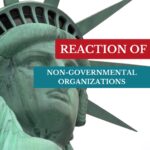13/02/2012 State of Emergency and Human Rights in Montenegro
13/02/201220/02/2012 On the occassion of World Day of Social Justice
22/02/201217/02/2012 NGOs have both legal and legitimate right to protest
Regarding the opinion of Prime Minister Igor Lukšić, reaffirmed in TV Vijesti show ”Načisto”, quoted as well in daily Vijesti on February 17:
“… NGOs should be engaged in activities characteristic for civil society, and NGOs around the world are not opposition organizations, but government’s partners in solving problems through various project activities. And that is why they get donations. Therefore, they do not get donations to organize protests, but to assist Government to solve certain problems …”
Human Rights Action (HRA) emphasises the right of nongovernmental organisations to organise public protests even against authorities.
Civil society organizations (CSOs) or nongovernmental organisations (NGOs) have the right to choose goals of activities and resources for achieving these goals as long as their means and objectives are nonviolent, and especially if they are aimed at human rights protection, including improvement of population’s social status.
The right to organize a protest and to protest against the government is both legitimate and legal right of NGOs in Montenegro, as well as in all other countries in the world that have adopted the minimum standards of human rights to freedom of thought, expression, assembly and association. On a daily basis we have been witnessing anti-government protests of NGOs around the world from Green Peace to Otpor.
At the same time every donor has a right to decide whether it will or not support NGOs ready to protest against a government. Hence, the history shows that private and state funds of the leading democracies in Europe and the USA permanently support NGOs who organize nonviolent demonstrations, protest walks, distribution of leaflets, and other forms of protest against government decisions. The peak of democracy is situation when a government funds NGOs ready to publicly call for resignation of ministers or the whole Government. Such cases were even present in Montenegro, for example in the case of the former Minister of human rights Ferhat Dinoša.
The role of NGOs is not just to be a silent government adviser on someone else’s expense, but also to be its public corrector, someone who publicly debates and encourages citizens and government to think and make changes, and, if necessary, they do it at public meetings, organized in accordance with the law. It is the right of every individual, as well as NGOs to get out into the street and to call for Government dismissal. The issue whether such calls will get political support is not connected to the right that can be expressed through a protest.
All who dare to come out into the public are subject to public judgment. Government, unlike NGOs, has the power to decide whether there will be electricity and whether the quality of life will be better or worse.
But in no way it should continue to decide who and how will have the right to publicly protest against it.






 English
English